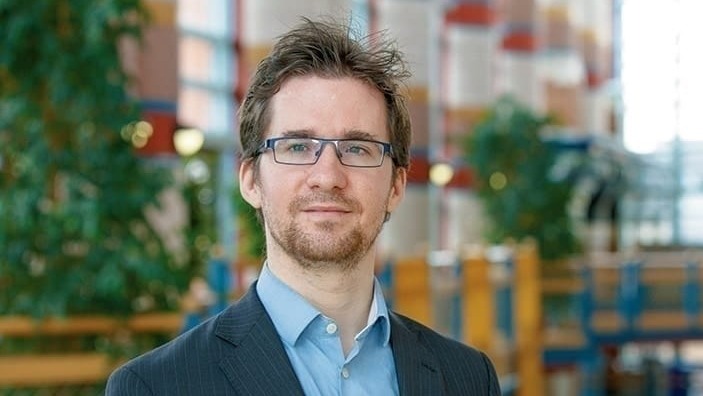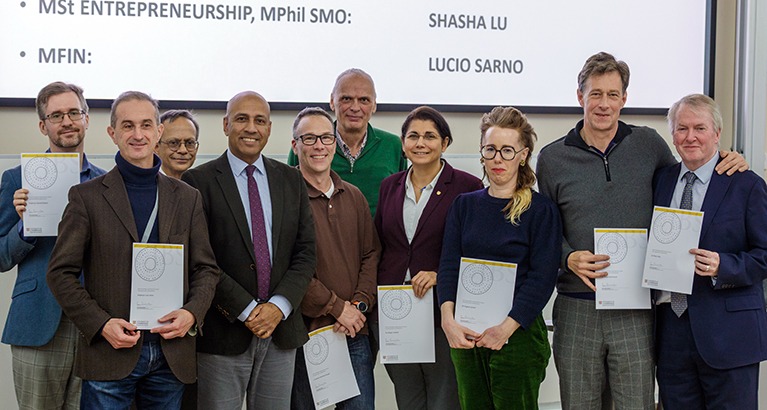Professor of Computational Social Science
Deputy Director of the MBA Programme
Academic Director of the Psychometrics Centre
BSc, MSc, PhD (University of Nottingham)
My research interests include psychometrics, psychology, decision-making, and social networks. I use big data to understand psychology, and I also do consultancy on the topics of psychometrics, and people analytics. My research has been cited by many governments’ national data protection regulators worldwide.
I’m a member of the Organisational Behaviour subject group at Cambridge Judge Business School, which aspires to promote our understanding of behaviour within organisations and translate our scientific research into practical applications.

Professional experience
David’s research uses big data to understand psychology. He published papers showing using social media data from millions of consenting individuals to show that the computer can predict a user’s personality as accurately as their spouse can. Follow-up research found that personalising an advert to the recipient’s psychology is more effective than generic ads.
This research has important public policy implications. Do consumers prefer their online experiences to be customised? How should consumers’ data be used to target them? Should regulators step in, and if so how?
David has spoken at workshops organised by the EU Data Protection Supervisor, by the European Parliament’s Science and Technology Options Assessment Panel, to UK government regulators, and to the Bank of England. His research has also been cited by many governments’ national data protection regulators worldwide.
David has also published research using various big data sources such as credit card data and textual data to show that spending money on products and services that match one’s personality leads to greater life satisfaction, that people tend to date others who have a similar personality, and that people who swear seem to be more honest.
David does consultancy on the topics of psychometrics, people analytics, and big data. He has worked on projects with companies including Amazon Payments, Barclays, Hilton Hotels, RBS, Shell, and Ubisoft.
Publications
Visit Professor Stillwell’s profile on Google Scholar for a list of his publications.
Awards and honours
- Cambridge Judge Business School Teaching Award, 2022
News and insights
Faculty news
2025 Cambridge Judge excellence in teaching awards
Eleven members of the Cambridge Judge Business School faculty are awarded teaching prizes for excellence across the Business School’s various programmes.
AI and technology
How psychometrics can enhance AI healthcare evaluation
Artificial intelligence holds great promise in healthcare. Yet such use of AI use poses risks, especially in relying on benchmarks to evaluate medical expertise and practice. Research co-authored at the Psychometrics Centre at Cambridge Judge Business School outlines a better methodology that improves benchmarking through the application of psychometrics.
AI and technology
Human brain vs AI: what makes better decisions?
Companies and other organisations are rapidly adopting artificial intelligence to drive strategy and planning. But there’s a key question: does AI actually make better decisions than humans? Academics art Cambridge Judge Business School are using recent research to help answer this question.
Media coverage
Cambridge Independent | 25 January 2023
Cambridge study highlights how social media turns values into negative traits
David Stillwell, Professor of Computational Social Science and Director of the Psychometrics Centre at Cambridge Judge Business School, speaks about the consequences of privileging hostile or negative content on social media.
“Even words connected to politics that seem to represent positive values – such as justice, democracy and equality – can actually result in negative sentiment because of the way those words are often used in tweets,” says David.
BBC Sounds | 24 November 2022
Science unwrapped – interactive science, medicine and technology
David Stillwell, Professor of Computational Social Science and Academic Director of the Psychometrics Centre at Cambridge University Judge Business School, talks to the Naked Scientists for their 30-minute deep-dive segment into personality testing.
Josephine Andresen, Researcher at Psychometrics Centre, was also interviewed.
The Week | 6 April 2022
The arguments for and against swearing
A study co-authored by David Stillwell, Professor of Computational Social Science and Academic Director of the Psychometrics Centre at Cambridge Judge Business School, is mentioned in an article about swearing, after BBC was forced to issue a swift apology for broadcasting a swear word during its coverage of the Oxford-Cambridge Boat Race.
“Swearing is often inappropriate but it can also be evidence that someone is telling you their honest opinion. Just as they aren’t filtering their language to be more palatable, they’re also not filtering their views.” David said.
Psychology Today, 1 April 2021
Are people who swear more honest?
Publico, 5 June 2019
The scientist who exposed the power of Facebook
Live Mint, 27 March 2019
Opinion: How the internet could end up wrecking Indian democracy
RSVP Live, 23 March 2018
Study finds foul mouthed people are more likely to be honest and trustworthy
New Scientist, 7 March 2018
I exposed how online profiling leaves us open to mass persuasion
Wired, 2 December 2017
This algorithm knows how you will vote based on the car you drive
MSN, 25 November 2017
This is what swearing says about you
BBC Radio Cambridgeshire, 21 November 2017
The Naked Scientists
The Guardian, 14 November 2017
One Facebook ‘like’ is all it takes to target adverts, academics find
Business Insider, 29 September 2017
What Facebook ‘likes’ say about you
Birmingham Mail, 2 August 2017
People who swear a lot are more honest
Alphr, 24 July 2017
Money can buy happiness – but only if it’s used to buy ‘time’
The Atlantic, 13 July 2017
The dark side of that personality quiz you just took
Los Angeles Daily News, 28 May 2017
Democrats’ curse words say more than they know
Business Weekly, 18 May 2017
Data science summit highlights Cambridge’s tech magnetism
New York Post, 16 May 2017
Facebook ‘likes’ are terrifyingly accurate window into your soul
Science Alert, 6 May 2017
Good news, humans: Swearing can actually make you stronger
BBC World Service, 20 April 2017
The Inquiry
Birmingham Mail, 12 April 2017
Why people who swear a lot are more honest?
INSEAD Knowledge, 11 April 2017
Our edge in a machine-dominated world
Cambridge Business Magazine, 1 April 2017
‘Smart’ photos can be deceiving
iNews, 27 March 2017
‘Opposites attract’ is a myth: The truth about what brings friends and couples together
Grazia Daily, 15 March 2017
Five bad habits that actually mean you’re brilliant (according to science)
BBC News, 13 March 2017
Big data unites the study of stars with cancer research
Inc, 16 February 2017
Do you swear a lot? That may just mean you’re honest
BBC Radio 5 Live,
Drive
The Times,
Do opposites attract? Only in the movies
Cambridge News, 7 February 2017
Machines can predict our intelligence
The Telegraph, 18 January 2017
Foul-mouthed people are also the most honest, study finds
Elle, 17 January 2017
Is our pursuit of happiness getting in the way of our long term wellbeing?
Mail Online, 2 January 2017
Why not to mind your language
Cambridge Business Magazine, 1 January 2017
Prepare for a lengthy debate on use of social media data
The Conversation, 3 November 2016
There really is a link between your Facebook posts and your personality
BBC Radio 5, 2 November 2016
Drive
The Guardian, 1 November 2016
What could Facebook target next? Our mental health data
Medical Express, 27 October 2016
Facebook updates could help to understand mental health disorders
The Wall Street Journal, 11 September 2016
The more cash people have, the happier they are
Yahoo Finance, 7 July 2016
An algorithm can predict how smart you are based on your Facebook photo
Cambridge Business Magazine, 1 June 2016
Study points to ‘happier’ e-commerce results
New Scientist, 20 May 2016
What your social media profile picture says about your personality
World Economic Forum, 21 April 2016
Can money buy you happiness? It depends on how you spend it
The Washington Post, 12 April 2016
Money can buy happiness – if you know how to use it
BBC Radio Cambridgeshire, 8 April 2016
News
CNBC, 8 April 2016
Study: Money does buy happiness
The Independent, 7 April 2016
Money could buy you happiness if the item matches your personality
ITV News, 7 April 2016
Study finds money can buy you happiness
The Telegraph, 7 April 2016
Money CAN buy happiness – if you spend in the right way
HR Magazine, 30 March 2016
Can software profile people better than HR?
The Huffington Post, 30 October 2015
Companies should use data transparently
The Wall Street Journal, 11 September 2015
Facebook ‘likes’ mean a computer knows you better than your mother
The Independent, 5 September 2015
What does Facebook know? New app uses what you ‘like’ to predict your personality




